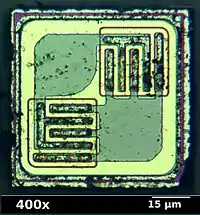2N3906
The 2N3906 is a commonly used PNP bipolar junction transistor intended for general purpose low-power amplifying or switching applications.[1][2] It is designed for low electric current and power and medium voltage, and can operate at moderately high speeds.


Overview
The 2N3906 is manufactured in a plastic TO-92 case. When looking at the flat side with the leads pointed downward, the three leads emerging from the transistor are, from left to right, the emitter, base, and collector leads.
The 2N3906 is specified by a collector current of 200 mA, collector-base and collector-emitter voltages of 40 V, for power dissipation of 300 mW. Its transition frequency Ft is 250 MHz, with a beta of at least 100.[1]
The complementary NPN transistor to the 2N3906 is the 2N3904.[3] Both types were registered by Motorola Semiconductor in the mid-1960s.
Part numbers
The 2N3904 (NPN) and 2N3906 (PNP) are complementary transistor pairs. These transistors are available in package styles TO-92, SOT23, SOT223 with different prefixes.
| BJT | Thru-hole | Surface-mount | |
|---|---|---|---|
| TO92 | SOT23 | SOT223 | |
| NPN | 2N3904[3] | MMBT3904 | PZT3904 |
| PNP | 2N3906[1] | MMBT3906 | PZT3906 |
References
- "2N3906 Datasheet (TO-92)" (PDF). ON Semiconductor. February 2010. Archived (PDF) from the original on August 8, 2019.
- "2N3906 Datasheet (TO-92)" (PDF). Micro Commercial Components (MCC). January 2013. Archived (PDF) from the original on August 8, 2019.
- "2N3904 Datasheet (TO-92)" (PDF). ON Semiconductor. August 2012. Archived (PDF) from the original on August 8, 2019.
Further reading
- Historical Databooks
- Small-Signal Semiconductors Data Book, 1218 pages, 1987, Motorola.
- Transistor and Diode Data Book, 1236 pages, 1973, Texas Instruments.